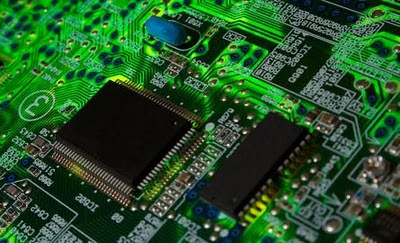A microcontroller (sometimes abbreviated µC, uC or MCU) is a small computer on a single integrated circuit containing a processor core, memory, and programmable input/output peripherals. Program memory in the form of NOR flash or OTP ROM is also often included on chip, as well as a typically small amount of RAM. Microcontrollers are designed for embedded applications, in contrast to the microprocessors used in personal computers or other general purpose applications.
Both the oven and the robot need some sort of thing which can make these decisions for them. Otherwise both of them are going to be useless. Another example can be a cell phone. It shows its battery level, warns us if the battery is low. When the charge is full, it tells us to
A Microcontroller is just like a computer.
The obvious question should be answered first. The word microcontroller is similar to the word microprocessor which is the core of modern computers.
Micro means something very small or tiny. The integrated circuits are fabricated in very small chips which have made our modern computers smaller.
Controller means something which has the ability to control. For example, deciding how much amount of heat to maintain in a microwave oven when it is set to run on auto cook modes or a worker robot which has to decide which box to put in which truck.
The answer is obvious, Microcontroller.
A Microcontroller is a chip which has the capability to decide and control situations according to the instructions provided by its user. The word Microcontroller is abbreviated as uC or MCU (Micro Controller Unit). We will sometimes refer to it as uC or MCU.
Where and why we need a Microcontroller?
Any system that needs some sort of automated control uses Microcontrollers. Actually we are using uC everyday even though we are not aware of them. For example, Modern Televisions, Cell Phones, Microwave Ovens, Washing Machines, Cars, Toys, Airplanes, Battery Chargers, Inverters and specially Robots. If you want to give your equipment a sophisticated ‘Brain’ so that it can monitor situations, process calculations and take decisions according to your requirement, you need to use a uC. It is the “Brain” of a robot.
A Microcontroller is just like a computer.
Difference between a Computer and a Microcontroller
After you have read up to this portion of the chapter, one question might come to your mind. What is the difference between the PCs we use in our daily life and the Microcontrollers? Well, there is more similarity then the differences. But there are significant differences which explain a uC being priced at as low as 60-100.
In a computer, we put on the processor on the motherboard. We also install RAM modules, Hard Discs etc. The motherboard contains the ROM that initiates the BIOS (Basic Input Output System).
Unlike Microprocessors, the Microcontrollers have everything that is required to perform its operation are built in a single package. That means a single MCU contains the processor, RAM, ROM, Flash Memory. All are included in a single chip. So a Microcontroller resembles a complete computer, well of course in a tiny format.
A Sample Microcontroller
|
A Sample Computer
| |
Clock Speed
|
16MHz
|
3.0 GHz
|
Program Storage
|
8 kilobyte Flash
|
500 Gigabyte Hard Disc
|
RAM
|
1 kilobyte
|
2 Gigabyte
|
The comparison reveals a major difference. Don’t underestimate the uC. It may not be adequate for encoding your HD videos but is great for our computing requirements in the circuits we might implement. For most applications we don’t need more than that.
So, we are getting a computer in a tiny package. That’s why MCUs are simple to use and very cheap compared to a PC. Microcontrollers can process quite complex functions, data manipulations and DSP algorithms. The data shown here are just for an ordinary MCU; there are more powerful MCUs available in the markets.






No comments:
Post a Comment